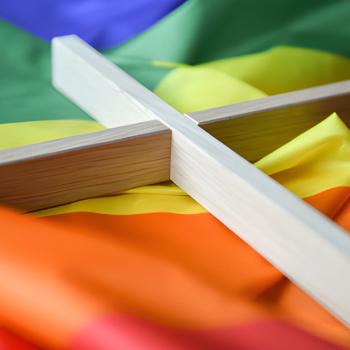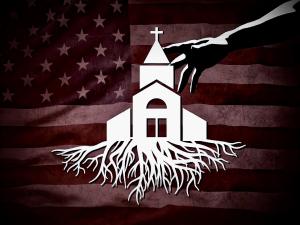
The heritage of evangelical Christianity in the United States is founded upon systemic racism that perpetuated itself generation after generation for centuries. Although both the church and America remains racially divided today, you and I can participate in a future where healing takes place.
The Great Compartmentalization
In the early 19th century, a religious revival known as the Second Great Awakening swept across the nation, igniting spiritual fervor and inspiring many to grapple with slavery among other issues.

/pixy.org
Christians compartmentalized their religious beliefs by participating in a society marred by deep injustices. For example, a charismatic preacher named Charles Finney forbade slaveholders from participating in communion, but opposed racial integration and the idea of Black individuals assuming leadership roles within the church.
Similarly, influential figures like George Whitefield and Jonathan Edwards condemned the cruelty of slavery, yet continued to own slaves themselves, and refused to endorse abolition.
Divine Order, Lost Cause
In the South, church leaders such as Reverend Dr. Basil Manly Sr. manufactured theological justifications for slavery, segregation, and racial hierarchies. He argued for the creation of the Southern Baptist Convention to support slave owners and slavery in general. His prolific publications regarding a “divine order” subjugating blacks successfully embedded white supremacy within North American Christianity.
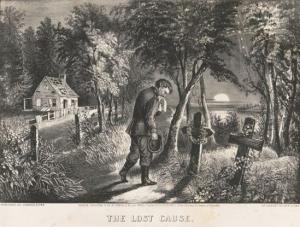
/1872, Library of Congress, Public domain.
After the American Civil War, many southern whites preached a mythological “Lost Cause” gospel idolatrizing the antebellum South and the Confederacy, promoting a social order that elevated whites and oppressed Blacks—even within the church.
Meanwhile, Jim Crow segregation persisted in Northern Protestant churches as well; virtually every northern city was fraught with racial hostility such as race riots, cross burnings, and even racially motivated murders.
Roots of Bitter Poison
By the time of civil rights era, white supremacy was already prevalent in white evangelical churches, with the Klu Klux Klan widespread across the south and white citizens councils in the north.
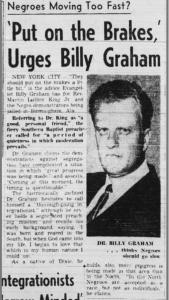
/Public Domain.
Black leaders like Dr. Martin Luther King, Jr., rose to national standing through community organization and marching to fight for racial equality. However, white church leaders, including evangelist Billy Graham, would preach in support of integration while criticizing civil rights protestors in newspaper interviews, sending the message that Black causes were not spiritually or morally worthy of white support.
This led to a continued racial division within churches throughout the 1960s and 1970s, contributing to broader societal unrest.
As liberals and Democrats began to successfully pass civil rights legislature empowering blacks in society, white conservative politicians began actively courting white evangelical voters, who were by far the largest voting bloc in the United States.
Slowly but surely, the conservative movement began to flourish, fueled almost completely by white evangelicals.
Consequently, the roots of both growth movements in the later half of the 20th century are intertwined with not merely racism, but attitudes and actions that may only be described as white supremacist.
My Country, ‘Tis of Thee?
By the 1990s, there was growing recognition among evangelicals for the need of racial reconciliation. The Southern Baptist Convention issued a formal apology for its past support of slavery and opposition to civil rights. Multiethnic churches emerged as a sign of a desire for greater diversity within Christian congregations.
However, these efforts were too little, too late. The damage had already been done.
The proof is in the pudding: recent studies show that 76% of white evangelicals still view symbols like the Confederate flag as expressions of Southern pride rather than oppression, and some deny the systemic nature of discrimination and police violence against Black Americans.

Despite concerns over his divisive rhetoric, white evangelicals overwhelmingly supported Donald Trump in the 2016 election (80% according to exit polling), highlighting the close connection between racial identity and the faith consumerism of many white Christians. This connection sometimes fosters a dangerous sense of entitlement and superiority, intertwining religious identity with a vision of America as a “Christian nation.”
Although overt racism is on the rise in today’s world, complacency and white privilege is taking center stage, even within the church.
A Tale of Two Cults
Because many evangelical Americans have only been exposed to church institutionally through programmed activities like scheduled services, the last generation of evangelicals in the United States have found substitutionary ways to identify as Christian.
The Cult of Hobby Lobby
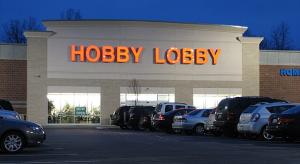
/Image: DangApricot/CC BY-SA 3.0 DEED
One prominent trend is a cult of consumerism, what I call the “Hobby Lobby Christian.” These middle-class Americans show their love for Jesus by decisively spending their money at “Christiany” businesses which they believe reflect their evangelical values, including Hobby Lobby, Chick-fil-a, In-N-Out Burger, and Forever 21 among lesser shining lights such as Cracker Barrel, Curves (gyms), and e-Harmony.
But not everyone can tug on a pair of Uggs and drive in a vehicle with heated seats to Hobby Lobby, while tapping on a phone the size of my bathroom mirror about something a Kardashian literally just Insta’d.
While it is true some might have the means to welcome hungry or homeless individuals into their homes, I suspect it would be far more likely to find a shiplap feature wall altar to Chip and Joanna Gaines, evangelical entrepreneurs whose successful marketing of wares adorn the homes and bodies of white evangelicals numbering in the hundreds of millions.
To be clear, there is nothing morally or spiritually wrong with spending your money with any of these companies whatsoever. Indeed, the businesses I mentioned often donate to make a difference in the lives of others (though some have historically donated to causes that were anti-LGBTQIA+).
But eating christian chicken sandwiches is not a substitute for making Christlike disciples, and in absence of an authentic relational faith connection, spending money that way for those purposes is white privilege.
More than just a socioeconomic difference, white evangelicals are specifically patterning this behavior because of the historical narrative I reported above. Therefore, not only do other ethnicities behave differently, their perception of church differs significantly as well.
The Cult of Fox News
The other trend is a cult of media, what I will term the “Fox News Christian.” These people likewise may not regularly attend traditional evangelical churches, sometimes preferring activities such as watching sports on TV, hunting, fishing, or just sleeping in. Because they believe the church is a scheduled event or activity that doesn’t always fit their desired schedule, these individuals compensate by consuming media they perceive fits a “Churchy” outlook.
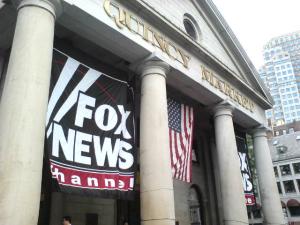
/by mroach/CC BY-SA 2.0 DEED
These individuals connect with voices such as Tucker Carlson, Sean Hannity, Laura Ingraham, Eric Metaxas, and Shannon Bream along with former politicians like Mike Huckabee and Sarah Palin.
The problem is not only that media personalities, pundits, politicians, and sometimes even pastors on TV misquote or mischaracterize scripture to fit a political agenda, but that these strong connections to media are expressed socially by opinions, purchases, and voting habits rather than in engaging in relationships that make Christlike disciples.
In no way do I mean that consuming such media is necessarily indicative of an individual’s politics, much less their relationship with God. Nor am I insinuating that those who hold conservative beliefs and vote accordingly have any spiritual or moral failing in any way.
But politics should not replace genuine discipleship. Voting and media consumption, whether conservative or Christian, doesn’t establish a relationship with Jesus or make you part of his church.
What these behaviors often characterize are the habits of white Americans who identify as evangelical Christians. This sharp contrast in media consumption and historical church experiences compared to other ethnicities can be identified as nothing except white privilege, highlighting the disparity between experiences and perspectives within the broader Christian community.
A Way Forward
To address the legacy of systemic racism within evangelical Christianity and move toward healing, there is no substitute for genuine discipleship.

It’s about more than just going to church or aligning with specific businesses or media outlets. True discipleship involves building relationships, engaging in acts of love and service, and embodying the teachings of Christ in our daily lives.
Racial reconciliation is a vital component of this journey. It requires reaching out to those who have been marginalized, just as Jesus did during his ministry. He valued women in a society that treated them as property, touched lepers who were stigmatized, accepted Samaritans despite religious and cultural differences, and ultimately died for sinners, regardless of their background or identity.
To truly combat racism and white privilege within evangelical Christianity, it is essential to put others before ourselves, reject divisive attitudes, and embrace a faith that is grounded in love, compassion, and empathy.
The call of Christ remains clear: “A new command I give you: Love one another. As I have loved you, so you must love one another” (John 13:34-35, NIV).
While the history of systemic racism within evangelical Christianity is undeniable, there is hope for a future of healing and reconciliation. This journey begins with recognizing the patterns that have perpetuated racial divides, whether through historical actions or modern consumer and media trends. It requires a return to the core principles of Christianity–love, empathy, and service–as the antidote to racism and white privilege.
Only through true discipleship and a commitment to love one another can we move beyond the past towards an inclusive and just future.






